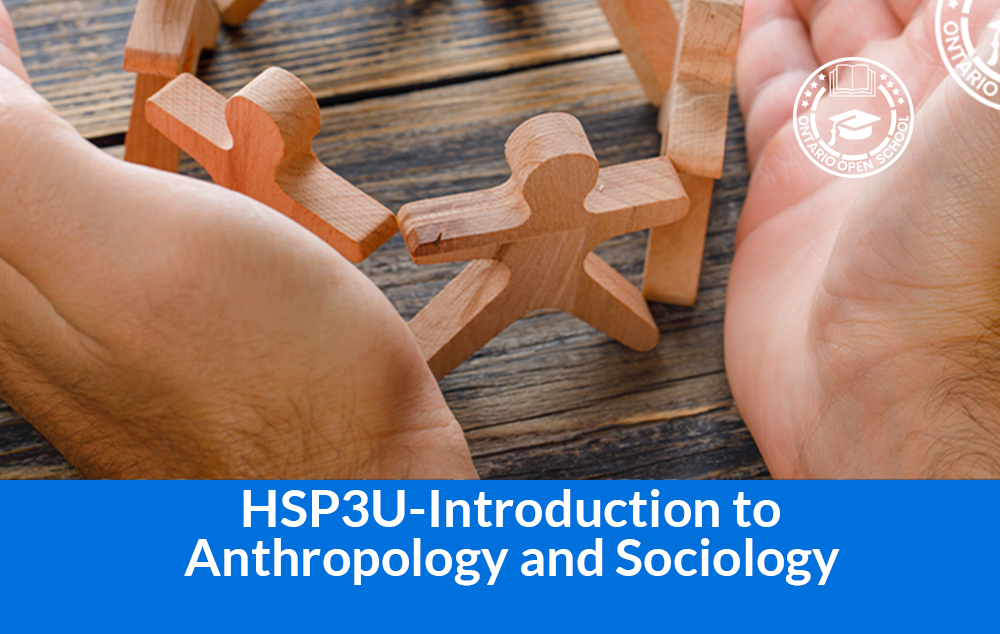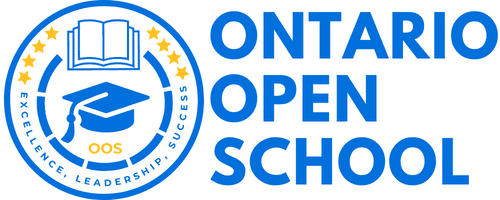- info@ontarioopenschool.com
- 647-494-4499
-
Unit 100 - 29 Gervais Drive, North York, ON.
M3C 1Y9
Copyright 2024 Ontario Open School Inc. All Rights Reserved.
This course provides students with opportunities to think critically about theories, questions, and issues related to anthropology, psychology, and sociology. Students will develop an understanding of the approaches and research methods used by social scientists.
Unit Order | Unit Name | Suggested Time |
|---|---|---|
| Unit 1 | Self and Others This unit will provide students with answers to some basic questions, such as what makes us human, how communication contributes to the uniqueness of humanity, and what factors influence human development. Students will examine the theories of various anthropologists, psychologists, and sociologists as they present their studies and answers to these questions. Students will learn how humans evolved and how genetics and the environment play significant roles in human development. By the end of the unit, students will have a better comprehension of human origins and development as a unique species in the world. | 40 hours |
| Unit 2 | Social Organization The first part of this unit explores individual and social conflict and cohesion. It identifies some personal sources of conflict, such as choices and ethics, and examines external forms of conflict, such as bullying and prejudice. Social inequality, poverty, racism, and stereotyping are considered as examples of conflict in society. The unit examines the effects these conditions have on individuals. The examples of conflict are taken from both the past and present, and they show how something like prejudice can escalate from minor incidents between individuals to serious and sometimes deadly conflicts between races and countries. The unit then looks at why individuals stray from the norms of society and examines examples of deviance carried to the extreme of criminal behaviour. It also looks at how society’s definition of deviance changes over time. Finally, the unit looks at the social organizations that provide society its cohesive force. | 35 hours |
| Unit 3 | Social Structure and Institutions This unit looks at the ways one’s behavior and outlook are shaped by small and large groups called social institutions. One spends much of their day involved in various social institutions. This process is called socialization, and it largely determines the kind of person you will become. Important institutions to one’s development will be examined such as family, school, and the workplace. Students will also examine the major institutions in Canadian society such as religion and how they are changing as our economy and society evolve. Finally, this unit will examine the institutions of health and law and order, particularly the police force and prisons. | 27 hours |
| Final Evaluation 30% | Final Assignment Final Exam | 6 hours 2 hours |
| Total | 110 Hours |
A wide variety of instructional strategies are used to provide learning opportunities to accommodate a variety of learning styles, interests and ability levels. These strategies include, but are not limited to:
Purpose
The primary purpose of assessment is to improve student learning. Assessment relates directly to the expectations for the course.
A variety of assessments for and as learning are conducted on a regular basis to allow ample opportunities for students to improve and ultimately demonstrate their full range of learning and for the teacher to gather information to provide feedback. Assessment tasks relate to the success criteria set out in lesson plans. Success criteria allow students to see what quality looks like.
Evaluation is the process of judging the quality of student work in relation to the achievement chart categories and criteria and assigning a percentage grade to represent that quality. Evaluation is based on gathering evidence of student achievement through:
Assessment for Learning – we provide feedback and coaching. Assessment FOR Learning is the process of seeking and interpreting evidence for the use of learners and their teachers to decide where the learners are in their learning, where they need to go, and how best to go there.
Assessment as Learning – we help students monitor progress, set goals, reflect on their learning
Assessment AS Learning is the process of the explicit fostering of students’ capacity over time to be their own best assessors, but teachers need to start by presenting and modeling external, structured opportunities for students to assess themselves.
Assessment of Learning – we use assessments to provide evaluative statements about student achievement. Assessment OF Learning is the assessment that becomes public and results in statements of symbols
(marks/grades/levels of achievement) about how well students are learning. It often contributes to pivotal decisions that will affect students’ future.
ASSESSMENT TOOLS
Strategies for Assessment & Evaluation for Student Performance
| Assessment and evaluation in this course will be continuous throughout the semester and will include a variety of methods. | ||
| Assessment As Learning | Assessment For Learning | Assessment Of Learning |
|
Student Product: Learning Logs KWL Chart Goal Settings
|
Student Product:
Assigned Questions / Worksheet / Homework Reflective Journal Diagnostic Quiz |
Student Product: Unit Culminating Activities Unit Tests Independent Study Project Final Exam |
|
Observation: Performance Tasks |
Observation:
Individual and/or Group Presentations and Seminars |
Observation: Individual/Group presentations and Seminars
|
|
Conversation: Reflective Discussion
|
Conversation:
Discussions
|
Conversation: Student Teacher Conferences Seminars |
Resources
http://www.edu.gov.on.ca/eng/policyfunding/growSuccess.pdf
Grading
Weighting of categories
| Knowledge/Understanding | Thinking/Inquiry | Communication | Application |
| 25% | 25% | 25% | 25% |

Course Grade | Grade 11 |
|---|---|
Course Code | HSP3U |
Course Category | Social Sciences and Humanities |
Course Type | University Preparation |
Course Delivery | Online |
Course Duration | 8hrs |
Course Credit | 0 |
Copyright 2024 Ontario Open School Inc. All Rights Reserved.
